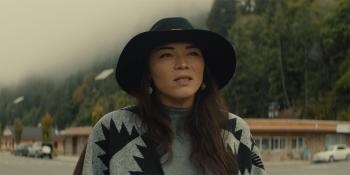Image Caption
Summary
Local Journalism Initiative Reporter
Windspeaker.com
The struggle faced by First Nation communities to access clean, potable water is highlighted in a film that will have its world premiere Sept. 15 at the Toronto International Film Festival.
Boil Alert is a documentary focused on activist Layla Staats from Six Nations of the Grand River in Ontario. Staats visits Indigenous communities in both Canada and the United States that have boil water advisories.
While she gains a better understanding about those clean water challenges, Staats also discovers a few things about herself during her travels.

Stevie Salas, a rock musician born in California who has Apache ancestry, helped write, direct and produce Boil Alert. It’s his fourth film. His first was RUMBLE: The Indians Who Rocked The World.
That 2017 film was inspired by Salas when he and Tim Johnson (Mohawk) created an exhibit for the Smithsonian National Museum of the American Indian about the Indigenous influence on American rock music. The two were executive producers on the film, which captured an award for masterful storytelling at the prestigious Sundance Film Festival.
His documentary The Water Walker premiered at TIFF in 2020. And earlier this year, Hail To The Breadsticks!, a film he also executive produced, premiered at the Nantucket Film Festival.
And now, Salas’ Boil Alert will be shown publicly for the first time at TIFF. Another screening will follow Sept. 16.
“I’m on fire,” he said of his film successes. “I don’t know what’s going on.”
He realizes the significance of having a film screen at the Toronto festival, which begins Sept. 7 and runs until Sept. 17.
“Any time that you can be at TIFF, for anybody, it’s a big deal,” he said. “And you have to take it very seriously. It’s a great honour for sure.”
Boil Alert was produced by Seeing Red 6 Nations, a Six Nations-based company that Salas founded with his business partner Bryan Porter.
“For us to be a little company from Six Nations trying to create awareness, it’s fantastic,” Salas said of Boil Alert’s inclusion in TIFF. “And we’re really lucky.”
Salas is hoping the film helps to brings attention to the seriousness of boil water advisories in Indigenous communities.
Salas said he became interested in the issue after a friend who worked for a water charity took him to Fiji a few years ago to view the water issues there. Salas told his friend there was no need to travel outside of North America to find communities suffering because of a lack of clean water.
“They had no idea, and they’re in the business,” Salas said. “Everybody is going around the world fixing all these issues around the world, thinking that us (Canada and the United States), two First World countries, that that doesn’t happen here. Well it happens here like crazy. And nobody knows. We just assume because we have so much money that this couldn’t possibly be true.”
Porter is also hoping that Boil Alert raises awareness.
“I've seen first-hand how difficult situations like these can be and want more people to understand what's really going on,” he said. “Layla's story, I think, is a perfect entry point into a broader conversation about Indigenous people and water rights today. Growing up on the reservation where families live on the same land over generations and generations fosters a different kind of perspective. We are raised to consider the impact of our actions seven generations into the future.”

Besides filming Boil Alert in her own Six Nations community, other locations Staats visits during the film include Neskantaga First Nation and Grassy Narrows First Nations, which are both located in Ontario, Church Rock in New Mexico and Wet'suwet'en First Nation in British Columbia.
Porter said Boil Alert spotlights the work a new generation of Indigenous people are doing to bring back that generational perspective.
“For that reason, it is both timely and timeless,” he said of the film.
Salas said Boil Alert will be screened at various other festivals globally after TIFF.
“We’re getting a million offers from film festivals right now all over the world,” he said, adding that Poland, Germany and France are some of the countries where the movie could be shown. “We just signed with a huge sales agent, a really cool company, and I don’t want to say it yet until I get all the papers signed (but) I’m going to figure out what film festivals I want to be at and... Hopefully we’re going to sell this sucker to somebody big.”
Local Journalism Initiative Reporters are supported by a financial contribution made by the Government of Canada.

